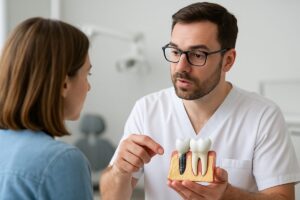If you’re thinking about changing the way your teeth look, porcelain veneers in Boston, MA might be a good fit. People who choose veneers usually want to fix discoloration, chips, gaps, or uneven teeth without long orthodontic treatment. This post explains what porcelain veneers are, the benefits, who makes a good candidate, what to expect during treatment, risks and care, alternatives, cost, and how to pick the right provider. Read on to see if porcelain veneers in Boston, MA could help you reach your smile goals.
What Are Porcelain Veneers?
Porcelain veneers are thin shells of ceramic that bond to the front of your teeth. They differ from composite veneers, which are made from tooth-colored resin placed directly on the tooth. Veneers also differ from crowns because crowns cover the whole tooth while veneers cover just the front surface. Porcelain looks very natural, resists stains better than resin, and can be matched to the shape and color you want. Many patients choose porcelain veneers Boston, MA for a long-lasting, natural-looking result.
Top Cosmetic and Functional Benefits of Porcelain Veneers in Boston, MA
Improve color, shape, and symmetry
Veneers mask deep stains that whitening can’t fix. They can close small gaps, lengthen short teeth, and reshape teeth to improve symmetry. A set of veneers creates a uniform, balanced smile that matches your facial features.
Durability and stain resistance
Porcelain is strong and resists discoloration from coffee, tea, and smoking better than natural enamel. With proper care, porcelain veneers maintain their color and shine and can last many years.
Who Is a Good Candidate for Porcelain Veneers?
Good candidates have healthy teeth and gums, enough enamel for bonding, and realistic expectations. Veneers are best if you want cosmetic changes to front teeth. They may not be right if you have untreated decay, active gum disease, severe teeth grinding, or very crooked teeth that need orthodontics first. A dentist will evaluate bite, oral health, and habits like clenching before recommending veneers.
What to Expect: The Porcelain Veneer Process in Boston, MA
Consultation and smile planning
Your first visit usually involves a discussion of goals, photos, and digital smile planning. Many offices use software to design the proposed smile so you can see expected results before treatment begins.
Tooth preparation and impressions
A small amount of enamel (often less than a millimeter) is removed so the veneer fits naturally. Impressions or digital scans are taken. Some practices offer temporary veneers while lab-made porcelain is created; others use CEREC® same-day milling for quicker results.
Final placement and follow-up
At the try-in visit, the dentist checks fit and shade, then bonds the veneers using a strong dental adhesive. You’ll have a follow-up to check comfort and bite. Minor adjustments can be made after placement.
Risks, Limitations, and Aftercare for Porcelain Veneers in Boston, MA
Common risks
You may experience sensitivity after enamel removal. Veneers are not reversible because enamel is altered. Porcelain can chip under heavy force or from biting hard objects; repairs require professional care.
Maintenance and longevity
Brush and floss daily and see your dentist regularly. Avoid chewing ice, hard candy, or using teeth as tools. If you grind your teeth, a nightguard can protect veneers. With good care, veneers often last 10–15+ years.
Alternatives to Porcelain Veneers
Consider cosmetic bonding if you want a lower-cost, reversible option for small chips or gaps. Crowns may be better if a tooth is heavily damaged or has had a root canal. Orthodontics (Invisalign®) can fix alignment first, which may reduce the number of veneers needed. Professional whitening can address mild stains without altering tooth structure.
Cost, Insurance, and Financing for Porcelain Veneers in Boston, MA
Costs vary by number of teeth, lab fees, and whether veneers are same-day or lab-made. Typical ranges are $900–$2,500 per tooth. Dental insurance often treats veneers as cosmetic and may not cover them. Many practices offer payment plans, third-party dental financing, or in-house financing to help spread costs.
How to Choose the Right Provider for Porcelain Veneers in Boston, MA
Ask to see before-and-after photos, ask about the dentist’s experience with veneers, and whether they use digital smile design or CEREC® technology. Ask what materials and labs they use, and if they offer warranties or repair policies. A clear treatment plan and realistic mockup of results are signs of a careful provider.
About Stuparich & Nouel Dental Associates (Light, trusted detail)
Stuparich & Nouel Dental Associates serves Boston’s South End and Back Bay with a focus on prosthodontics and cosmetic restorations. The team provides multidisciplinary care for complex cases and routine cosmetic needs, using advanced tools to plan and deliver predictable results for porcelain veneers Boston, MA.
Credentials of Drs. Stuparich & Nouel
– Prosthodontic specialists with decades of combined experience – Advanced implant training at the Misch Implant Institute – Tufts affiliations and teaching roles
For more about our specialists, visit Dr. Stuparich and Dr. Nouel.
Advanced Technology That Improves Veneer Results
The practice uses CBCT imaging, Digital Smile Design, CEREC® same-day milling, and guided planning to improve precision and predictability for porcelain veneers Boston, MA.
Frequently Asked Questions
Q: How long do veneers last? A: With proper care, most last 10–15 years or longer. Q: Are veneers painful? A: Preparation is usually done with local anesthesia. Some sensitivity may occur but pain is minimal. Q: Can veneers be whitened? A: Porcelain does not whiten. Pick a shade you like at the start; natural teeth can be whitened to match if needed. Q: Can I get veneers if I grind my teeth? A: Grinding can damage veneers. Your dentist may recommend a nightguard or other treatments before veneers. Q: How many visits are required? A: Typically 2–3 visits for lab-made veneers, or 1–2 visits if same-day CEREC® veneers are used.
Conclusion and Next Steps
Porcelain veneers Boston, MA can transform stained, chipped, or uneven front teeth into a natural, balanced smile. They work best for patients with healthy gums, enough enamel, and realistic goals. If you’re in Boston and want a personalized evaluation, schedule a consultation to review smile design options and costs. Contact Stuparich & Nouel Dental Associates to discuss whether porcelain veneers Boston, MA are the right solution for your smile.




